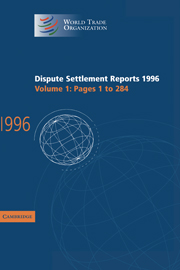Book contents
- Frontmatter
- Contents
- United States – Standards for Reformulated and Conventional Gasoline, complaints by Venezuela (WT/DS2) and Brazil (WT/DS4): Report of the Appellate Body
- United States – Standards for Reformulated and Conventional Gasoline, complaints by Venezuela (WT/DS2) and Brazil (WT/DS4): Report of the Panel
- European Communities – Trade Description of Scallops, requests by Canada (WT/DS7), Peru (WT/DS12) and Chile (WT/DS14): Report of the Panel (Request by Canada)
- European Communities – Trade Description of Scallops, requests by Canada (WT/DS7), Peru (WT/DS12) and Chile (WT/DS14): Report of the Panel (Request by Peru and Chile)
- Japan – Taxes on Alcoholic Beverages, complaints by the European Communities (WT/DS8), Canada (WT/DS10) and the United States (WT/DS11): Report of the Appellate Body
- Japan – Taxes on Alcoholic Beverages, complaints by the European Communities (WT/DS8), Canada (WT/DS10) and the United States (WT/DS11): Report of the Panel
European Communities – Trade Description of Scallops, requests by Canada (WT/DS7), Peru (WT/DS12) and Chile (WT/DS14): Report of the Panel (Request by Canada)
Published online by Cambridge University Press: 22 December 2017
- Frontmatter
- Contents
- United States – Standards for Reformulated and Conventional Gasoline, complaints by Venezuela (WT/DS2) and Brazil (WT/DS4): Report of the Appellate Body
- United States – Standards for Reformulated and Conventional Gasoline, complaints by Venezuela (WT/DS2) and Brazil (WT/DS4): Report of the Panel
- European Communities – Trade Description of Scallops, requests by Canada (WT/DS7), Peru (WT/DS12) and Chile (WT/DS14): Report of the Panel (Request by Canada)
- European Communities – Trade Description of Scallops, requests by Canada (WT/DS7), Peru (WT/DS12) and Chile (WT/DS14): Report of the Panel (Request by Peru and Chile)
- Japan – Taxes on Alcoholic Beverages, complaints by the European Communities (WT/DS8), Canada (WT/DS10) and the United States (WT/DS11): Report of the Appellate Body
- Japan – Taxes on Alcoholic Beverages, complaints by the European Communities (WT/DS8), Canada (WT/DS10) and the United States (WT/DS11): Report of the Panel
Summary
On 19 May 1995, the Government of Canada requested consultations with the European Communities (“EC”) concerning French Order NOR MERP9300051A of 22 March 1993 and its amendments, relating to the official names and permitted trade descriptions of scallops in France. This request was made pursuant to Article XXII:1 of the General Agreement on Tariffs and Trade 1994 (“GATT 1994”), Article 14.1 of the Agreement on Technical Barriers to Trade (“TBT Agreement”), and Article 4 of the Understanding on Rules and Procedures Governing the Settlement of Disputes (“DSU”). In accordance with Article 4 of the DSU, the request was circulated to Members of the World Trade Organization (“WTO”) on 24 May 1995 (WT/DS7/1).
Pursuant to Article 4.11 of the DSU, Chile on 31 May 1995 (WT/DS7/2), and Iceland (WT/DS7/3), Japan (WT/DS7/4) and Peru (WT/DS7/5) on 2 June 1995, requested to be joined in the consultations requested by Canada. On 23 June 1995, the EC informed the Dispute Settlement Body (“DSB”) that it had accepted these requests (WT/DS7/6). Consultations were held in Geneva on 19 June 1995.
Consultations failed to settle the dispute and, on 7 July 1995, Canada requested the DSB to establish a panel, at its next meeting, pursuant to Article XXIII of GATT 1994, Article 14 of the TBT Agreement and Articles 4 and 6 of the DSU (WT/DS7/7 and Corr.1). Canada requested that the panel consider and find that the French Order and subsequent amendments are:
(a) inconsistent with Article 2 of the TBT Agreement;
(b) inconsistent with Articles I and III of GATT 1994; and
(c) nullifying and impairing benefits accruing to Canada under the WTO Agreement.
On 19 July 1995, pursuant to the request made by Canada, the DSB established a panel with standard terms of reference. The terms of reference of the Panel are the following:
“To examine, in the light of the relevant provisions of the covered agreements cited by Canada in document WT/DS7/7, the matter referred to the DSB by Canada in that document and to make such findings as will assist the DSB in making the recommendations or in giving the rulings provided for in those agreements”.
Australia, Chile, Iceland, Japan, Peru and the United States reserved their rights to participate in the Panel proceedings as third parties.
- Type
- Chapter
- Information
- Dispute Settlement Reports 1996 , pp. 89 - 92Publisher: Cambridge University PressPrint publication year: 2000
- 3
- Cited by

